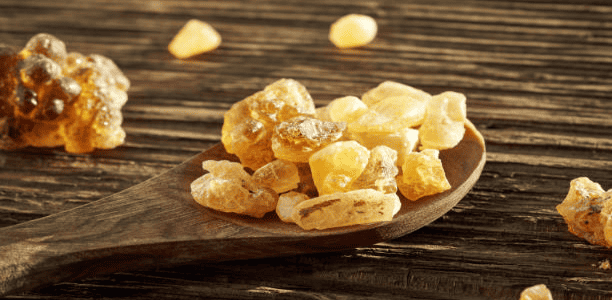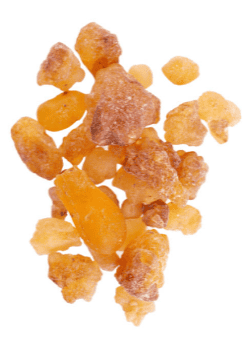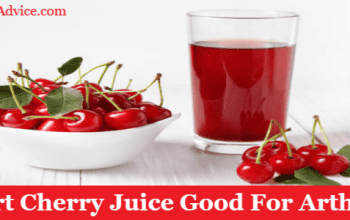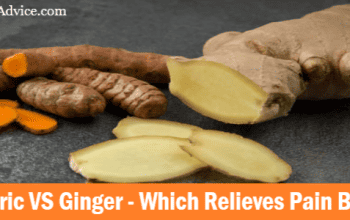
So does Boswellia work for improving your health?
- What are its top benefits?
- And is it actually effective for any health problem?
- Is it true that it reduces inflammation?
- Or are its benefits just a myth?
Well, let me give you a quick hint – its benefits are real, they're not a myth.
So let's discuss the amazing ways in which this herb can help you.
Note: This article includes references and studies on Boswellia and its benefits.
Does Boswellia Work? (In A Nutshell)
Firstly – Boswellia is also known as Indian frankincense.
It has been used as a traditional medicine, most commonly for inflammation.
But as of now, its top-studied active compound is called boswellic acid.
That's because it's the main responsible behind Boswellia's incredible proprieties:
- reduces arthritis-related symptoms
- supports an optimal digestion
- promotes respiratory health
- improves skin-related problems
- offers anti-cancer properties
In this article, we're going to focus on Boswellia's effect on inflammation and other health concerns.
It's an anti-inflammatory because it regulates the mediators that cause inflammation.
But there's more it can do:
- packed with antioxidants that can fight back free radicals
- can treat sun damage while also offering protection
- also have some real anti-cancer properties
For this reason, some clinical trials also focused on this herb.
Almost all of them concluded that it can assist with apoptosis and avoid cancer cell division.
Also – its angiogenic ability can help disrupt the further growth of tumors.
Overall, Boswellia is a promising herb for alleviating symptoms and attacking the root cause of some health issues.
So that's why you should try to incorporate it into your daily routine.
Still, don't expect it to be the final cure for any health issues.
It's definitely not anything like that…
Instead – consider it as an additional help to elevate your overall health.
What Is Boswellia?
As usual – let's start by listing the basic info about this herb [1]:
- its scientific name is Boswellia serrata
- it's also known as Indian frankincense
- different cultures use it as a traditional medicine
Additionally – its notable compound is called Boswellic acid.
It has been studied a lot, due to its strong anti-inflammatory activity [2].
Like turmeric, it works by blocking the production of pro-inflammatory cytokines and enzymes [3].
Some examples of these enzymes are called 5-LOX ad COX-2.
That's why it's also popular as an anti-inflammatory herb.
But besides that, we're going to talk more about its other benefits below.
Just one thing – Boswellia's effect is pretty similar to that of turmeric.
Well – it's because both herbs are great for inflammation and anything related to it.
#1 – Reduces Arthritis & Joint Pain
The most common type of joint inflammation is caused by arthritis.
A popular type of inflammatory arthritis is called Rheumatoid Arthritis (RA).
With that, here are the things you need to know about RA [4]:
- is an autoimmune and inflammatory disease
- appears when your immune system attacks your healthy cells by mistake
- joint pain is one of the immediate consequences
Also – unlike other types of arthritis, RA is chronic and long-lasting problem.
Now, what are the most common signs of this condition?:
- several aching joints
- joint stiffness and swelling
- weakness and fatigue
- weight loss without even trying
- fever and redness
However, Boswellic acid reduces the production of inflammatory molecules.
Additionally – RA is caused to an overactive immune response.
But Boswellic acid can suppress the abnormal activity of the immune system.
That's why this herb is so effective for inflammatory arthritis.
Plus – joint pain actually appears because of this inflammation.
If the root disappeared, any joint discomfort would also go away.
That's why Boswellia's anti-inflammatory properties can reduce symptoms of inflammatory arthritis.
#2 – Supports Digestive Health
Another notable benefit of Boswellia is its ability to promote digestive health.
It can improve symptoms caused by Chron's disease and ulcerative colitis.
Now – the “umbrella term” for both conditions is called Inflammatory Bowel Disease (IBD).
As the name suggests, the reason behind is chronic inflammation.
But let me first give you some symptoms of IBD [5]:
- bloating and constipation
- appetite and weight loss (unintended)
- low energy or fatigue
- bleeding in the rectum and bloody stools
- excruciating stomach ache
- frequent diarrhea
Firstly – IBD is associated with increased leukotrienes, which are inflammatory mediators [6].
But what does Boswellia have to do with these mediators?
Well, in short – it decreases their production.
Consequently, they stop attacking healthy cells from specific tissues (in this case, the digestive tract).
Since Boswellic acid targets the source of inflammation, it will also reduce the repercussions.
Also – IBD can greatly damage the gut lining, which can lead to further health conditions.
With that, Boswellia also has the potential to heal injured intestinal tissues and inflamed mucosal linings [8].
Overall – besides prevention, this herb also offers protection from further gut damage.
#3 – Enhances Respiratory Health
Let's now talk about the effects of Boswellia on chronic inflammatory lung disease.
To be exact, we're talking about Chronic obstructive pulmonary disease (COPD).
Here are some general things about this condition [9]:
- is a group term for diseases that cause blockage in the airflow
- its main symptom are breathing-related problems
- some examples include emphysema and chronic bronchitis
- there's no cure for COPD (only treatment)
Now – COPD appears when inflammatory cells infiltrate the lung tissues and airway [10].
But due to Boswellia's anti-inflammatory properties, the number of inflammatory cells should decrease.
Another highlight of this herb is its expectorant properties [11].
This means that it can ease the removal of exces respiratory mucus.
In this way, it can promote comfort and alleviate congestion.
Overall – besides Boswellia's effect on inflammation, it can also help with blocked airways.
However, keep in mind that it's not a cure for COPD – it can only offer relief.
#4 – Improves Skin Health
Now – Boswellia is also studied for its benefits on the skin.
It seems to e very helpful for photodamaged and age-related skin conditions [12].
So far, here are the outcomes of topical products containing it:
- increases elasticity and firmness
- decreases the production of sebum
- renews dermal tissue
- repairs injured skin
- reduces the appearance of age spots and hyperpigmentation
- offers hydration and moisturization
Additionally – its antioxidants can neutralize free radicals that cause by the sun's UV rays.
In this way, it can suppress the triggers that can result in skin cancer [13].
Now – oxidative stress and chronic inflammation contribute to the skin's premature aging.
But due to Boswellia's antioxidant properties, this process can also be delayed.
Summing it up, Boswellia has several studies about how it can improve sun-related damage.
But so far – they are based on topical products that contain it as a main ingredient.
#5 – Provides Anti-Cancer Properties
Lastly, let's talk about the connection between Boswellia and cancer.
But first – let's dig deeper into how cancer appears [14]:
- caused by the uncontrollable growth of the body's cells
- these cells then spread to different parts of the body
- they manage to hide from the immune system, so that they won't be detected
In addition, cancer can also be a genetic disease (it's caused by changes in the genes).
These alterations are responsible for the way cancer cells function, divide or grow.
So instead of dying (as other cells do), they trick the immune system into letting them thrive even more.
In a healthy body, apoptosis (programmed cell death) naturally happens.
It's because it's the normal response of the immune system to get rid of abnormal cells.
Now – boswellic acid also features anti-cancer properties on top of the benefits featured previously.
Some studies demonstrated how boswellia can induce apoptosis of cancer cells [15].
Now, angiogenesis means that new blood vessels grow from the existing ones.
However, Boswellia can also potentially inhibit inflammatory angiogenesis [16].
In this way, it prevents cancerous tumours from receiving nutrients and spreading even more.
Overall – this herb is a promising addition to stopping the spread of cancer cells.
That's because it targets the mechanism behind how they multiplication.
However – cancer has no cure at the moment, let's face it.
So this herb can only offer small benefit only (looking at the bigger picture(.
Final Conclusion
To summarize, Boswellia is a promising herb for inflammation and other health issues.
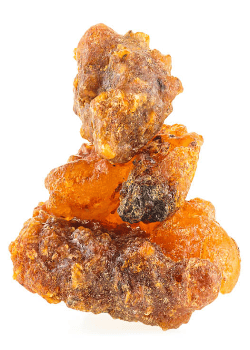
- alleviates symptoms of arthritis
- improves digestive health
- ameliorates respiratory health
- promotes a better skin
- has anti-cancer properties
Again – Boswellia's active compound is called Boswellic acid.
It has a similar effect as turmeric when it comes to impeding the release of pro-inflammatory mediators.
In addition to that, it can also reduce the skin damage caused by UV rays and free radicals.
Lastly – it prevents the growth of cancer cells and tumors.
As you can see, this herb is known in alleviating painful symptoms.
So that's why it's present in several products – especially in those against pain.
However – don't consider it a cure for inflammation or cancer, because it's really not that.
Just look at it as a supplementary help for your health problems.
References:
1 – https://www.sciencedirect.com/-topics/-boswellia-serrata/
2 – https://www.sciencedirect.com/-topics/-boswellic-acid/
3 – https://www.ncbi.nlm.nih.gov/-pmc/articles/-PMC3309643/
4 – https://www.cdc.gov/arthritis/basics/-rheumatoid-arthritis/
5 – https://www.health.harvard.edu/-inflammatory-bowel-disease/
6 – https://www.sciencedirect.com/-biological-sciences/-boswellia/
7 – https://www.ncbi.nlm.nih.gov/-pmc/articles/-PMC2674731/
8 – https://www.ncbi.nlm.nih.gov/-pmc/articles/-PMC8877038/
9 – https://www.cdc.gov/-Chronic-obstructive-pulmonary-disease/
10 – https://pubmed.ncbi.nlm.nih.gov/-27373322/
11 – https://pubmed.ncbi.nlm.nih.gov/-27117114/
12 – https://pubmed.ncbi.nlm.nih.gov/-19918712/
13 – https://www.ncbi.nlm.nih.gov/-pmc/articles/-PMC6544398/
14 – https://www.cancer.gov/understanding/-what-is-cancer/
15 – https://www.ncbi.nlm.nih.gov/-pmc/articles/-PMC3258268/
16 – https://pubmed.ncbi.nlm.nih.gov/-21864545/

